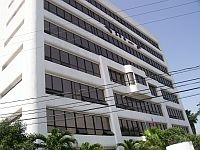Haiti's telecommunications company, commonly known as Teleco, is an
absolute monopoly. Sure, as with perfect competition, absolute monopoly
does not occur in real life and actual market structures vary between
the two extremes of nearly perfect competition and near monopoly. Still,
there is a reason for so. It is the only firm nationwide that
does offer landline telephone services or the sole supplier of a
homogeneous product for which there are no subsititutes.
Some professional crooks may refer to the wide availability of cellular
telephones in the Caribbean nation in an attempt to dispute our
categorization of Teleco as an absolute monopoly.
One thing is for sure. Because of a cellular telephone set limited usage
option when compared to that of a landline one it is nothing more than a quasi-close
substitute product.
It is primarily because of all of the above that the estimated market value of Teleco is not as
reduced as Haiti's government claims. $58 million is the total sum the
Haitian government says it will receive for the transfer of majority
ownership (70 percent) to Vietel Corporation, a Vietnamese business
enterprise.
Transparency is sure one of the many attributes of
democracy. Before the commercial transaction involving Teleco is
finalized, the Haitian government has an obligation to communicate to
the news media the contents of the related sales contract of which it
has entered into with the Southeast Asia corporation so Haitians will
cease to be rightly believed that the reason why more than two thirds of Teleco's
ownership will be transferred for a de minimus amount of money, given its
importance as an absolute monopoly, is because kickbacks, as usual, will
be paid to many senior government officials involved. |

